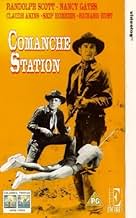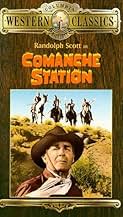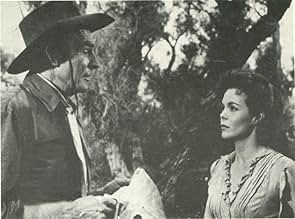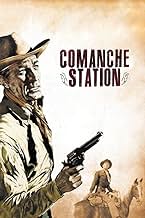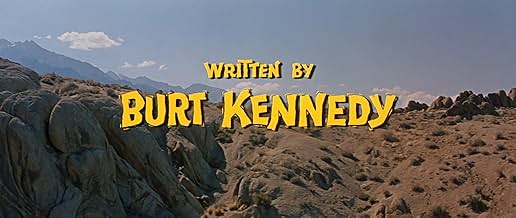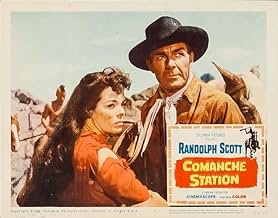ÉVALUATION IMDb
7,0/10
4,8 k
MA NOTE
Ajouter une intrigue dans votre langueA man saves a woman who had been kidnapped by Comanches, then struggles to get both of them home alive.A man saves a woman who had been kidnapped by Comanches, then struggles to get both of them home alive.A man saves a woman who had been kidnapped by Comanches, then struggles to get both of them home alive.
Avis en vedette
Comanche Station is the last of several films Randolph Scott made for Budd Boetticher with Columbia pictures. This would have been his last film, but for being lured to do just one more, the immortal Ride the High Country.
The film combines elements of The Naked Spur and Two Rode Together and blends them successfully. Scott is a man with one obsession, to get his wife back from the Comanches who kidnapped here ten years earlier. Whenever he hears of a white woman being put up for trade by the Indians he heads out with trade goods and buys her in the hopes of finding his beloved.
On this trip he ransoms Nancy Gates away from the Comanches. Later on he runs into an old enemy Claude Akins traveling with two young guns, Richard Rust and Skip Homeier. It seems as though Nancy's husband has put up a ten thousand dollar reward for her.
Akins is a truly malevolent figure, a scalphunter who kills Indians and sells their scalps for bounty. Unfortunately the two have need of each other in hostile Indian territory.
Randolph Scott's western heroes usually have an edge to them, they are not pure heroes as Joel McCrea's are. But in this film he's poaching on McCrea's territory in gallantry. His behavior towards Nancy Gates is at all times chivalrous. I wouldn't be surprised if there was a medieval origin to the plot of Comanche Territory.
Had Scott not come back to do Ride the High Country, Comanche Station would have been a good film to go out on.
The film combines elements of The Naked Spur and Two Rode Together and blends them successfully. Scott is a man with one obsession, to get his wife back from the Comanches who kidnapped here ten years earlier. Whenever he hears of a white woman being put up for trade by the Indians he heads out with trade goods and buys her in the hopes of finding his beloved.
On this trip he ransoms Nancy Gates away from the Comanches. Later on he runs into an old enemy Claude Akins traveling with two young guns, Richard Rust and Skip Homeier. It seems as though Nancy's husband has put up a ten thousand dollar reward for her.
Akins is a truly malevolent figure, a scalphunter who kills Indians and sells their scalps for bounty. Unfortunately the two have need of each other in hostile Indian territory.
Randolph Scott's western heroes usually have an edge to them, they are not pure heroes as Joel McCrea's are. But in this film he's poaching on McCrea's territory in gallantry. His behavior towards Nancy Gates is at all times chivalrous. I wouldn't be surprised if there was a medieval origin to the plot of Comanche Territory.
Had Scott not come back to do Ride the High Country, Comanche Station would have been a good film to go out on.
While the western genre is not my favourite one of all film genres (not sure which one is my favourite due to trying to appreciate them all the same), there is a lot of appreciation for it by me. There are a lot of very good to great films, with the best work of John Ford being notable examples.
'Comanche Station' is the final collaboration of the seven films director Budd Boetticher and lead actor Randolph Scott did together in the late 50s. By all means 'Comanche Station' is not their best pairing (perhaps towards the lesser end, which is not a knock as this merely means it's only because the best of them are so great), but one can totally see the appeal of their collaborations and both Boetticher and Scott are well served, the film being a good representation of both. It is a very good note to go out on and of their films it is perhaps the most overlooked. Which is a shame because it's a very good film with many excellent elements.
By all means not perfect. Nancy Gates is rather bland in a role that is rather underwritten. The film loses momentum on occasions.
However, Scott is as stoic and charismatic as ever with an appealingly craggy edge, being both likeable and tough. Every bit as good is a truly menacing Claude Akins, relishing his quite meaty villainous character. The two work very effectively together and their final confrontation is one of 'Comanche Station's' high points. Boetticher's direction is efficient and lean.
A big shout has to go to the production values. While there is grandeur and atmosphere to the settings it's the photography that's the star, especially in the unforgettable wordless opening sequence, one of my favourite openings of Boetticher's/Scott's films together. The music is rousing yet never intrusive and the more eventful parts blister.
There is thankfully no fat or ramble to the thought-probing, tight and sharply focused script and the storytelling is brutally bleak and movingly elegiac, mostly nicely paced too. 'Comanche Station' may not have the same depth of characterisation as other Boetticher/Scott outings or character complexity, but the two lead characters are interesting and the character interaction is a major plus point numerous times. Notably with Scott and Akins in their final confrontation, which positively blisters.
On the whole, very good. 8/10 Bethany Cox
'Comanche Station' is the final collaboration of the seven films director Budd Boetticher and lead actor Randolph Scott did together in the late 50s. By all means 'Comanche Station' is not their best pairing (perhaps towards the lesser end, which is not a knock as this merely means it's only because the best of them are so great), but one can totally see the appeal of their collaborations and both Boetticher and Scott are well served, the film being a good representation of both. It is a very good note to go out on and of their films it is perhaps the most overlooked. Which is a shame because it's a very good film with many excellent elements.
By all means not perfect. Nancy Gates is rather bland in a role that is rather underwritten. The film loses momentum on occasions.
However, Scott is as stoic and charismatic as ever with an appealingly craggy edge, being both likeable and tough. Every bit as good is a truly menacing Claude Akins, relishing his quite meaty villainous character. The two work very effectively together and their final confrontation is one of 'Comanche Station's' high points. Boetticher's direction is efficient and lean.
A big shout has to go to the production values. While there is grandeur and atmosphere to the settings it's the photography that's the star, especially in the unforgettable wordless opening sequence, one of my favourite openings of Boetticher's/Scott's films together. The music is rousing yet never intrusive and the more eventful parts blister.
There is thankfully no fat or ramble to the thought-probing, tight and sharply focused script and the storytelling is brutally bleak and movingly elegiac, mostly nicely paced too. 'Comanche Station' may not have the same depth of characterisation as other Boetticher/Scott outings or character complexity, but the two lead characters are interesting and the character interaction is a major plus point numerous times. Notably with Scott and Akins in their final confrontation, which positively blisters.
On the whole, very good. 8/10 Bethany Cox
Comanche Station is produced and directed by Budd Boetticher and stars Randolph Scott, Claude Akins, Nancy Gates, Skip Homeier & Richard Rust. It's written by Burt Kennedy with music and cinematography from Mischa Bakaleinikoff & Charles Lawton Jr. respectively.
Jefferson Cody has for many years been looking for his wife who was kidnapped by Indians. Taking time out from his futile search, he trades with the Comanches to get a woman, Nancy Gates, released. During the journey back to reunite Nancy with her husband, they run into an outlaw and his two protégés. Stating that the Comanches are on their trail and speaking about a reward being offered for Nancy, relations start to disintegrate by the hour.
This was to be the last of seven collaborations between director Budd Boetticher and Western legend Randolph Scott, and it's a most fitting sign off from the duo. Between them they managed to make Westerns with an almost haunting cloud hanging over them, themes of loneliness, complex characters and scenarios segue throughout their output. Here in this fine picture we find Scott's Cody in a complete state of loneliness, but outside of the pain the character clearly carries with him, Cody is a classic Western hero, courage and integrity are fortitude's by which he lives his life.
As this tale unfolds it's evident that Boetticher isn't prepared to offer up conventional Western standards, this, like many of Boetticher's other Westerns, is not a standard Oater, a good versus evil fable, it's a cunningly intelligent picture that's both sad in texture, and also in heart. The film is boosted by Charles Lawton Jr's camera work as he captures some stunning outdoor scenery, the rugged rocks and dusky land creates some striking compositions around the troubled characters.
See this if you are one of those people who thinks Westerns were merely an excuse for Cowboys and Indians high jinx. Boetticher and Scott, leading lights in the sub genre that featured the Ranown Westerns. 8/10
Jefferson Cody has for many years been looking for his wife who was kidnapped by Indians. Taking time out from his futile search, he trades with the Comanches to get a woman, Nancy Gates, released. During the journey back to reunite Nancy with her husband, they run into an outlaw and his two protégés. Stating that the Comanches are on their trail and speaking about a reward being offered for Nancy, relations start to disintegrate by the hour.
This was to be the last of seven collaborations between director Budd Boetticher and Western legend Randolph Scott, and it's a most fitting sign off from the duo. Between them they managed to make Westerns with an almost haunting cloud hanging over them, themes of loneliness, complex characters and scenarios segue throughout their output. Here in this fine picture we find Scott's Cody in a complete state of loneliness, but outside of the pain the character clearly carries with him, Cody is a classic Western hero, courage and integrity are fortitude's by which he lives his life.
As this tale unfolds it's evident that Boetticher isn't prepared to offer up conventional Western standards, this, like many of Boetticher's other Westerns, is not a standard Oater, a good versus evil fable, it's a cunningly intelligent picture that's both sad in texture, and also in heart. The film is boosted by Charles Lawton Jr's camera work as he captures some stunning outdoor scenery, the rugged rocks and dusky land creates some striking compositions around the troubled characters.
See this if you are one of those people who thinks Westerns were merely an excuse for Cowboys and Indians high jinx. Boetticher and Scott, leading lights in the sub genre that featured the Ranown Westerns. 8/10
The last of the seven Scott/Boetticher collaborations and although it's not one of my favorites {THE TALL T (1957) and RIDE LONESOME (1959) come out ahead}, it's still worth owning on DVD if Columbia/Tristar ever sees fit to release it.
Randolph Scott plays a rancher named Jefferson Cody who's wife was kidnapped by the Comanches a few years before. When he hears that the Comanches are holding a white woman, he goes to them for a trade and winds up with another man's wife named Mrs. Lowe (Nancy Gates).
As they head back, they stop at Comanche Station in order to water their horses and get fresh supplies. When they arrive there, they see three men being chased by a bunch of Comanches on the warpath. Cody recognizes one of them as Ben Lane (Claude Akins), a soldier he had drummed out of the army for an atrocity against the Indians, many years before. He also suspects Lane is trafficking in scalps and that's why the Indians are after them.
They manage to fight them off and when the coast is clear, Lane informs Mrs. Lowe that she has a $5,000 reward put up for her by her husband. Mrs. Lowe then suspects Cody of his intentions but it's apparent from the beginning that Cody isn't interested in any reward money. He just wants to find out what happened to his wife.
Also Lane has a habit of saying "Ha-lo.." every time he's being addressed. A nice script touch put in there by Burt Kennedy who wrote the script. It gives Lane something to distinguish him by.
It now becomes a battle of wills between Cody and Lane with Mrs. Lowe and Lane's two dimwitted sidemen (played by Skip Homeier and Richard Rust) looking on. When Frank (Homeier) is sent up the creek to see if the Comanches have cut off their trail, he comes floating back down, dead with an arrow in his back. And later when Dobie (Rust) has a change of heart and wants to throw in with Cody, he gets shot in the back by Lane for his efforts.
That shot warns Cody that Lane is nearby and the inevitable showdown takes place in the Lone Pine rocks. We all know who wins that one, right? Cody finally brings Mrs. Lowe back to her husband only to learn that he is blind and really doesn't care what's happened to her. He just wants her back.
Beautiful widescreen print that was remastered in the late 1990s, this one would be a welcome addition to any western library. It needs a DVD release.
7 out of 10
Randolph Scott plays a rancher named Jefferson Cody who's wife was kidnapped by the Comanches a few years before. When he hears that the Comanches are holding a white woman, he goes to them for a trade and winds up with another man's wife named Mrs. Lowe (Nancy Gates).
As they head back, they stop at Comanche Station in order to water their horses and get fresh supplies. When they arrive there, they see three men being chased by a bunch of Comanches on the warpath. Cody recognizes one of them as Ben Lane (Claude Akins), a soldier he had drummed out of the army for an atrocity against the Indians, many years before. He also suspects Lane is trafficking in scalps and that's why the Indians are after them.
They manage to fight them off and when the coast is clear, Lane informs Mrs. Lowe that she has a $5,000 reward put up for her by her husband. Mrs. Lowe then suspects Cody of his intentions but it's apparent from the beginning that Cody isn't interested in any reward money. He just wants to find out what happened to his wife.
Also Lane has a habit of saying "Ha-lo.." every time he's being addressed. A nice script touch put in there by Burt Kennedy who wrote the script. It gives Lane something to distinguish him by.
It now becomes a battle of wills between Cody and Lane with Mrs. Lowe and Lane's two dimwitted sidemen (played by Skip Homeier and Richard Rust) looking on. When Frank (Homeier) is sent up the creek to see if the Comanches have cut off their trail, he comes floating back down, dead with an arrow in his back. And later when Dobie (Rust) has a change of heart and wants to throw in with Cody, he gets shot in the back by Lane for his efforts.
That shot warns Cody that Lane is nearby and the inevitable showdown takes place in the Lone Pine rocks. We all know who wins that one, right? Cody finally brings Mrs. Lowe back to her husband only to learn that he is blind and really doesn't care what's happened to her. He just wants her back.
Beautiful widescreen print that was remastered in the late 1990s, this one would be a welcome addition to any western library. It needs a DVD release.
7 out of 10
This is the final film that was directed by Budd Boetticher and starring Randolph Scott. Like their previous collaborations, they both work together to produce Westerns that manage to rise above the mediocre norm. In this film, a fairly typical plot idea is executed very well--with a grace and style that make the film well worth seeing.
Randolph Scott, as usual, plays a nice but tough guy. He's brave enough to come into a Comanche stronghold in order to negotiate for the release of a White woman kidnapped by the tribe. However, trouble is in store when three drifters come upon Scott and the woman. It seems that the leader of this group (Claude Akins) is a real rogue and plans with his men to kill Scott and the woman. It seems that the woman's husband has offered a reward for her--and it can be collected dead or alive! So what did I like about the film? First, as usual, Randolph Scott is amazing. He plays the perfect cowboy hero--tough, slow to speak and anger but also a decent man through and through. Plus, he's much more believable than the bigger than life characters John Wayne usually played. I loved Wayne's films, but he was always too tough and too in command. Scott is much more like a very capable 'everyman' character. Second, as usual, Boetticher deliberately underplays the action--producing a muted but also quite believable film. Third, the film had a really nice ending--quite the twist.
You can't do a lot better than a Scott/Boetticher western. While this isn't their best, it certainly is quite good.
Randolph Scott, as usual, plays a nice but tough guy. He's brave enough to come into a Comanche stronghold in order to negotiate for the release of a White woman kidnapped by the tribe. However, trouble is in store when three drifters come upon Scott and the woman. It seems that the leader of this group (Claude Akins) is a real rogue and plans with his men to kill Scott and the woman. It seems that the woman's husband has offered a reward for her--and it can be collected dead or alive! So what did I like about the film? First, as usual, Randolph Scott is amazing. He plays the perfect cowboy hero--tough, slow to speak and anger but also a decent man through and through. Plus, he's much more believable than the bigger than life characters John Wayne usually played. I loved Wayne's films, but he was always too tough and too in command. Scott is much more like a very capable 'everyman' character. Second, as usual, Boetticher deliberately underplays the action--producing a muted but also quite believable film. Third, the film had a really nice ending--quite the twist.
You can't do a lot better than a Scott/Boetticher western. While this isn't their best, it certainly is quite good.
Le saviez-vous
- AnecdotesLast of the "Ranown Westerns", produced by Randolph Scott and his partner Harry Joe Brown under the Ranown Pictures banner. Scott decided to retire after this one, but two years later he was talked out of retirement by Sam Peckinpah for Ride the High Country (1962). After that film, Scott retired for good.
- GaffesDuring the final shootout with Claude Akins, Randolph Scott and Nancy Gates run and hide in a small rock cave in the hills. As they look out of the cave, a crew member in a blue shirt stands in the path in front of them. When Randolph Scott leaves the cave, he runs right past this crew member.
- ConnexionsFeatured in The Guardian Interview with Budd Boetticher (1994)
Meilleurs choix
Connectez-vous pour évaluer et surveiller les recommandations personnalisées
- How long is Comanche Station?Propulsé par Alexa
Détails
- Date de sortie
- Pays d’origine
- Langues
- Aussi connu sous le nom de
- Comanche Station
- Lieux de tournage
- société de production
- Consultez plus de crédits d'entreprise sur IMDbPro
- Durée1 heure 13 minutes
- Rapport de forme
- 2.35 : 1
Contribuer à cette page
Suggérer une modification ou ajouter du contenu manquant

Lacune principale
By what name was Prisonnière des Comanches (1960) officially released in India in English?
Répondre

